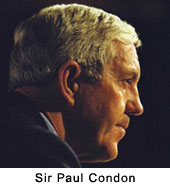Condon warns of radical measures
Sir Paul Condon, head of the International Cricket Council's anti-corruption squad, has warned that match-fixing is still rampant in the sport.
 In his interim report submitted to the ICC yesterday, Condon says that match-fixing has occured as recently as during the one-day series between New Zealand and Pakistan in March-April 2001.
In his interim report submitted to the ICC yesterday, Condon says that match-fixing has occured as recently as during the one-day series between New Zealand and Pakistan in March-April 2001.
Condon argues that a section of umpires, players and officials are so deeply compromised, and so heavily involved with underworld elements, that it is now impossible for them to back out of fixing.
The solution, he claims in his report, is to introduce certain "radical but commonsense" measures to stamp out the problem in its entirety.
Condon, who made it clear that this was merely an interim report and that his probe would continue at least until 2003, said that on the positive side, the action being taken by the ICC, and by various national boards, has meant that the underworld has stopped making random approaches to players, and is now focussed only on those players and officials who are heavily compromised and in no position to refuse.
"My ambition is to make it so tough for the few bad guys still left that the risks are not worth it," Condon said in a media briefing after submitting his report.
Condon's report makes a case for match-fixing having been a part of the sport for at least the last two decades, and fixes part of the blame on the proliferation of cricket matches, especially the one day game.
The Condon report is now in possession of Lord Griffiths, head of the ICC's code of conduct committee. The interim report summarises a year's work by Condon and his team of six former police officials. Griffiths along with committee members Oliver Popplewell (England), Justice Shah (Pakistan), Denys Williams (West Indies) and Richie Benaud (Australia) will study the report in its entirety before submitting it to the ICC's full board on May 21.
The ICC is then expected to vote on a suggestion that Team Condon be given wider powers in order to allow the unit to deal with individual players suspected of misconduct.
The report -- which interestingly does not name any players for fear of libel suits even though it lays bare a large mass of evidence -- will be made fully public on May 23.